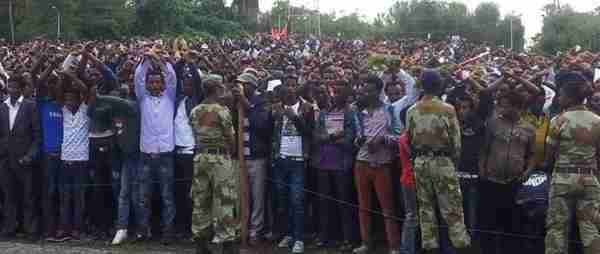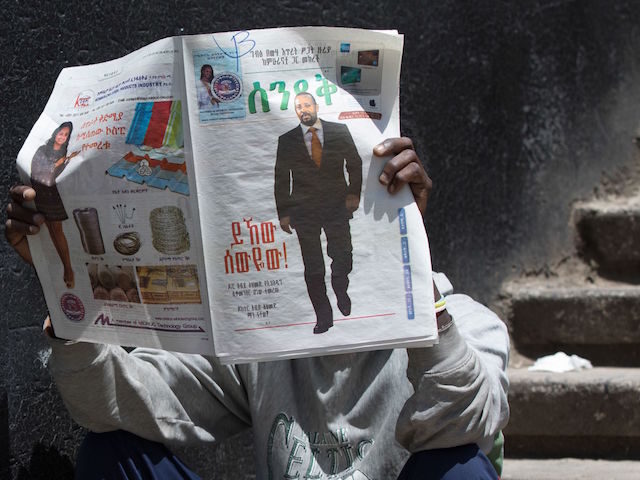This morning’s key headlines from GenerationalDynamics.com
- Ethiopia chooses Oromo leader, Abiy Ahmed, hoping to reduce violence
- Kenya’s government vs the judiciary – tensions mount over farcical deportation spectacle
Ethiopia chooses Oromo leader, Abiy Ahmed, hoping to reduce violence

Ethiopian protesters facing the military
Ethiopia has been without a prime minister since February 15, when prime minister Hailemariam Desalegn resigned, saying, “I see my resignation as vital in the bid to carry out reforms that would lead to sustainable peace and democracy.”
Since late 2015, there have been massive anti-government protests in Ethiopia’s Oromia region, which later spread to the neighboring Amhara region, leaving hundreds dead and resulting in tens of thousands of arrests. A state of emergency was imposed in October 2016, allowing mass detentions, and imposing numerous restrictions on people’s movement and communication. The state of emergency ended in August 2017, but massive protests began again, with millions of protesters by February, leading to Hailemariam’s resignation.
The situation has worsened considerably since Hailemariam’s resignation. Almost 10,000 Ethiopians, mostly ethnic Oromos, have fled across the border into Kenya, after Ethiopian government soldiers began shooting civilians indiscriminately, even in their homes and shops.
In the hopes of ending the chaos and bloodshed, Ethiopia’s ruling government coalition chose an Oromo, Abiy Ahmed, 42, to be a leader of the coalition. He is now expected to be voted in by parliament as the country’s next prime minister.
Abiy is being described as a “polyglot” because he is a speaker of three Ethiopian languages and English. He holds a doctorate from Addis Ababa University in traditional conflict resolution and has represented his Oromiya hometown of Agaro in parliament since 2010. He is a retired lieutenant-colonel who previously served as director of the nation’s Information Network Security Agency, which says it provides technical intelligence to support the government.
The obvious hope is that by selecting an Oromo as leader, Abiy will be able to “reason with” the Oromo people and end the massive protests.
An analogy can be drawn with the situation in Myanmar (Burma). The Burmese army, under the leadership of Buddhist Monk Ashin Wirathu, began conducting massacres, rapes, and torture against ethnic Rohingyas. When Nobel Peace Prize winner Aung San Suu Kyi effectively became the country’s leader, it was welcomed by the entire international community with the hope that the Burmese army would then allow the Rohingyas to live in peace. Instead, the violence has only gotten worse, to the point of ethnic cleansing and genocide, with some 800,000 Rohingyas forced to flee the violence by crossing the border into Bangladesh. You can argue whether Suu Kyi approves of the ethnic cleansing, or whether she disapproves but is forced to approve by the Burmese army.
We may be seeing the first signs of a similar situation in Ethiopia. Abiy Ahmed is just one person, while the existing government, dominated by ethnic Tigrayans, holds all 547 seats in parliament. Abiy is going to be a lone voice in the wilderness, compared to the traditional opposition.
There may be a brief pause, but we can expect the protests and violence to start again and continue. What will Abiy do then? Will he be another Aung San Suu Kyi and provide cover for continued Tigrayan violence against Oromos and Amharas? Or will he resign, just as Hailemariam Desalegn, and denounce the violence?
It really does not make much difference. Either way, we can expect the violence to continue, and we can expect millions more Oromos and Amharas to flee across the border into Kenya, further destabilizing the region. Africa News and Al Jazeera and Reuters and The Nation (Kenya, 14-Mar) and Bloomberg
Related Articles
- Thousands of Ethiopian Oromos flee into Kenya, threatening regional stability (15-Mar-2018)
- Ethiopia declares state of emergency after shock resignation of prime minister (17-Feb-2018)
- Ethiopia declares extraordinary six-month state of emergency (10-Oct-2016)
- Generational history of Ethiopia and Eritrea (14-Jun-2016)
- Tensions rise between Egypt and Ethiopia over Nile River dam (25-Jan-2018)
Kenya’s government vs the judiciary – tensions mount over farcical deportation spectacle
While Ethiopian Oromos are seeking fleeing violence into Kenya, there is also chaos in Kenya’s capital city Nairobi, where a farcical deportation spectacle highlighted an increasing conflict between the government of Uhuru Kenyatta and the judiciary.
Uhuru Kenyatta and his major opposition are from two ethnic tribes that have been at war in the past: respectively the Kikuyu tribe and the Luo tribe. The enmity between the two tribes has affected the political sphere, and from there it has spread into a conflict between the government and the judiciary.
The first major split occurred last year, when Kenya’s Supreme Court shocked pretty much everybody and sided with Odinga in claiming that the August 8 presidential election was “invalid, null and void,” forcing a new election. Kenyatta was furious, as he began calling the judges “crooks,” saying that there was problem with the court, and promising to “fix it” after he was reelected.
Kenyatta did win the election, but has been cracking down on Odinga’s supporters, and arresting many of them. One of those supporters is political activist Miguna Miguna. In February, the court ordered the government to release him from jail, and the government ignored the court order.
Now there has been a farcical new chapter in this drama. This week, a court held several top Kenyan government officials in contempt for refusing to release Miguna Miguna from custody. Instead of releasing him, the government thugs allegedly drugged him and bundled him onto a plane to Dubai. He wrote in social media:
I was dragged, assaulted, drugged and forcefully flown to Dubai. I woke up in Dubai and the despots are here insisting that I must travel on to London.
…
I woke up in Dubai. I’m sick. I need medical treatment. A Mr Njihia is threatening me. I need urgent help here. I want to take a flight only to Nairobi. Nowhere else!
Video of security guards manhandling Miguna as they tried to force him onto a plane the same day went viral, while a number of journalists covering the story were allegedly assaulted.
The chief justice, David Maraga, criticized the government, saying: “Disobeying court orders is inimical to the rule of law.” The interior minister, inspector general of police and head of immigration have been convicted of contempt of court. Standard Media (Kenya) and BBC and Standard Media
Related Articles
- Kenya cracks down on political opposition after mock inauguration (04-Feb-2018)
- Kenya’s Supreme Court issues ‘historic’ ruling, overturning presidential election (02-Sep-2017)
- Torture and murder of election official raise fears of violence in Kenya (01-Aug-2017)
- Severe drought in Kenya increases violence among herders, farmers and police (14-Nov-2017)
- Post-election massacre in Kenya raises concerns of tribal war (02-Jan-2008)
KEYS: Generational Dynamics, Ethiopia, Hailemariam Desalegn, Tigrayans, Oromos, Amharas, Abiy Ahmed, Myanmar, Burma, Ashin Wirathu, Aung San Suu Kyi, Rohingyas, Kenya, Nairobi, Miguna Miguna, David Maraga, Uhuru Kenyatta, Kikuyu, Raila Odinga, Luo
Permanent web link to this article
Receive daily World View columns by e-mail

COMMENTS
Please let us know if you're having issues with commenting.